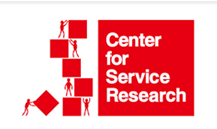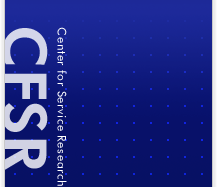
- > Organization
- > Center for Service Research
- > Introduction
|
Introduction
Mission
The Center for Service Research (CfSR) was established in April 2008 to explore systematic research methodologies for service industries. The principal mission is to improve productivity of the service industries based on scientific and engineering methodologies.
Service Engineering of CfSR
To achieve improvements in service productivity, mainly three approaches are popular : (1) marketing science approach, (2) industrial engineering approach, and (3) computer science approach. In addition to the aspects, it should be noted that, in services, ghuman factorsh are further more crucial than in manufacturing, and therefore, modeling the ghumanh functions is important.
The CfSR explores the forth approach, that is, human-centered service engineering. The approach repeats the optimized design loop in actual service fields. The loop consists of: (1) the observation of human behaviors (of such as customersf and service employeesf) in service fields, (2) analysis and modeling of data obtained in the service field, (3) re-design of the existing service model through dialogical simulations, and (4) application to the actual service.
Research in Business FieldsResearch in Business Fields Service engineering requires research in actual service fields. Human behaviors are observed in the actual fields, and obtained large-scale data is modeled and visualized for the manager of the service in order to re-design the service process. CfSR aims to establish general and reproducible elemental methodologies for helping various service industries. Moreover, CfSR challenges to develop an application method of those elemental methodologies for small service industries. The fields include: retail, restaurant, healthcare, tourism, amusement, contents, mobility support, and office support services. Research FieldsThe CfSR takes roles on advancing service engineering research as well as on an interface bridging academia, government, and industry to enable effective collaborations.
The teams share the research fields, engage in projects collaboratively by cooperating with industry, academia and government, and continuously advance research in various service business fields. |



